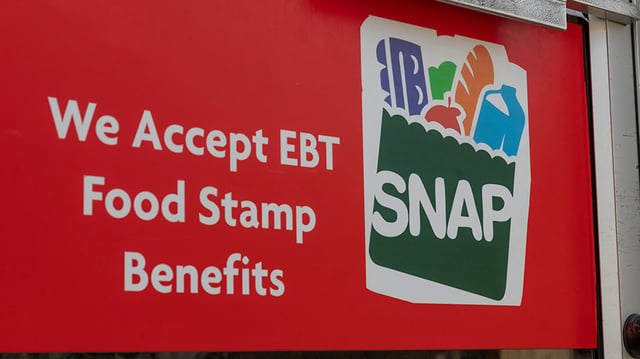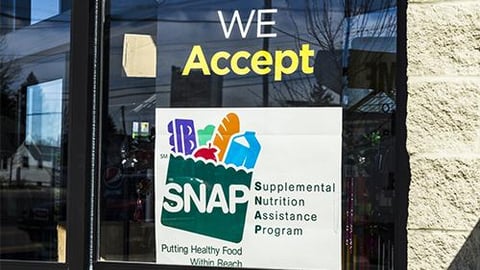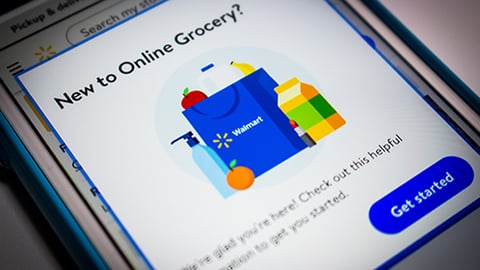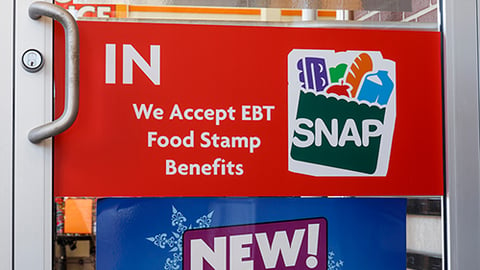Online SNAP Program Puts Participants’ Privacy at Risk
The steadily expanding online Supplemental Nutrition Assistance Program (SNAP) pilot program from the U.S. Department of Agriculture (USDA) is exposing program participants to a loss of their privacy via “increased data collection and surveillance,” along with risks involving “intrusive and manipulative online marketing techniques,” according to a new study from the Center for Digital Democracy (CDD).
Funded by the Robert Wood Johnson Foundation as part of a collaboration among four civil rights, digital rights and health organizations, Color of Change, UnidosUS, CDD and Berkeley Media Studies Group, the report contends that the digital techniques of online retailers — among them granular data profiling, predictive analytics, geolocation tracking, personalized online coupons, AI and machine learning — are used to promote unhealthy products, drive impulse purchases and increase overall spending at checkout.
While these practices affect all online shoppers, the report notes that “they pose greater threats to individuals and families already facing hardship,” adding that e-commerce data methods “are likely to have a disproportionate impact on SNAP participants, which include low-income communities, communities of color, the disabled and families living in rural areas. The increased reliance on these services for daily food and other household purchases could expose these consumers to extensive data collection, as well as unfair and predatory techniques, exacerbating existing disparities in racial and health equity.”
Launched last year in a few states with an initial set of eight retailers – Amazon, Dash’s Market, FreshDirect, Hy-Vee, Safeway, ShopRite, Walmart and Wright’s Market – the online program has quickly rolled out to a majority of the states, in part due to the ongoing COVID-19 pandemic, to allow SNAP participants to shop more safely from home in accordance with “shelter-in-place” recommendations.
“The SNAP program is one of our nation’s greatest success stories because it puts food on the table of hungry families and money in the communities where they live,” observed Dr. Lori Dorfman, director of the California-based Berkeley Media Studies Group. “Shopping for groceries should not put these families in danger of being hounded by marketers intent on selling products that harm health. Especially in the time of coronavirus, when everyone has to stay home to keep themselves and their communities safe, the USDA should put digital safeguards in place so SNAP recipients can grocery shop without being manipulated by unfair marketing practices.”
CDD’s research also found that the USDA relied on what it called “the flawed and misleading privacy policies” of the pilot’s participating companies, which failed to provide sufficient data protections, and that the pilot’s requirements didn’t adequately limit the use of SNAP participants’ data for marketing.
“In the absence of strong baseline privacy and ecommerce regulations in the U.S., the USDA’s weak safeguards are placing SNAP recipients at substantial risk,” said Dr. Katharina Kopp, deputy director and director of policy at Washington, D.C.-based CDD, as well as one of the report’s authors. “The kinds of e-commerce and Big Data practices we have identified through our research could pose even greater threats to communities of color, including increased commercial surveillance and further discrimination.”
“Being on SNAP, or any other assistance program, should not give corporations free rein to use intrusive and manipulative online marketing techniques on Black communities,” asserted Jade Magnus Ogunnaike, senior campaign director at Oakland, California-based Color of Change. “Especially in the era of COVID, where online grocery shopping is a necessity, Black people should not be further exposed to a corporate surveillance system with unfair and predatory practices that exacerbate disparities in racial and health equity, just because they use SNAP. The USDA should act aggressively to protect SNAP users from unfair, predatory, and discriminatory data practices.”
“The SNAP program helps millions of Latinos keep food on the table when times are tough, and our nation’s public health and economic crises have highlighted that critical role,” pointed out Steven Lopez, director of health policy at Washington, D.C.-based UnidosUS. “Providing enhanced access to healthy and nutritious foods at the expense of the privacy and health of communities of color is too high of a price. Predatory marketing practices have been linked to increased health disparities for communities of color. The USDA must not ignore that fact and should take strong and meaningful steps to treat all participants fairly, without discriminatory practices based on the color of their skin.”
The report urged the USDA to “take an aggressive role in developing meaningful and effective safeguards” against what the groups deemed manipulative and discriminatory practices before moving the SNAP online pilot beyond its initial trial, recommending instead that the various stakeholders work together to restructure the program.
Additionally, the groups have sent a letter to Secretary of Agriculture Sonny Perdue, calling for USDA to take immediate action to bolster online protections for SNAP participants. In the July 16 letter, the signatories revealed their “plan to share the report and its recommendations with Congress, asking lawmakers to conduct oversight hearings for the SNAP online purchasing program.”











